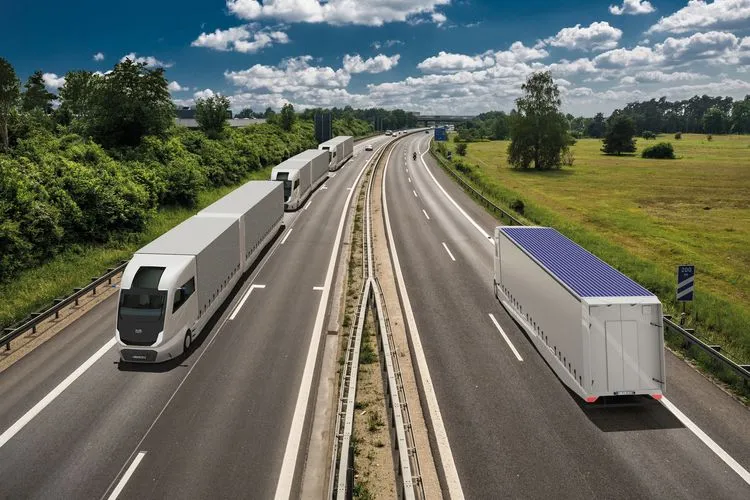Truck 2030-Bavarian cooperation for transport efficiency
Project completed - Contact: Sebastian Wolff, M.Sc.
Trucks will remain indispensable for the transport of goods in the coming decades. According to the forecast of the Federal Ministry of Transport and Digital Infrastructure, truck freight traffic will increase by 39 percent by 2030 compared to 2010. Efficient and environmentally friendly transport concepts are therefore becoming increasingly important in order to relieve traffic and avoid emissions such as carbon dioxide, soot particles and nitrogen oxides. Tomorrow's freight transport places high demands on a new generation of vehicles: the tare weight of the truck must be reduced in relation to the weight of the payload in order to improve transport efficiency. In addition, pollutant-reducing measures such as alternative energy sources and energy recovery systems promise further progress in consumption and environmental protection. For this reason, the Technical University of Munich and the East Bavarian Technical University of Regensburg, together with partners from industry and research, have developed a new vehicle concept for future long-distance road freight transport. By combining research with the experience of manufacturers and customers, every aspect of road freight transport was considered.
Webseite: http://www.truck2030.tum.de/en/home/
Project goals
A vehicle concept for road freight transport was developed, taking a holistic view of the drive train and the design of the tractor unit and trailer. The total operating costs were reduced by up to 30 percent. To achieve this, it was necessary to forecast the transport scenarios in the year 2030. In order to increase energy efficiency, alternative energy sources such as natural gas, synthetic fuels or battery storage are being investigated as new solutions for climate-friendly, low-emission and low-noise drive systems. In combination with new developments in the fields of aerodynamics, lightweight construction and energy recovery, this will make it possible to increase energy efficiency in the drive and braking systems. Transport efficiency is increased by adapting the vehicle concept to the customer's applications and interfaces. The result is an operating cost-optimised long-distance vehicle that contributes to more sustainability in freight transport by significantly reducing pollutant emissions. In addition, the vehicle cab has also been redesigned so that the driver can make better use of the time available through highly automated driving.
Key issues
1. People: How can the driver make good use of the time freed up by automated driving? How do I motivate the driver to a healthier lifestyle?
2. Transport & Logistics: What are the requirements of a forwarding agency as a customer? What does a cost-efficient vehicle concept look like in 2030?
3. Politics: How can the legislator create the framework conditions to meet the increasing transport volume? What infrastructure is worth investing in the long term?
4. Environment: Which driving concept can sustainably meet the increasing demand? How can the defined climate targets be achieved?
People
The researchers' concept is based on the assumption that the truck of the future will drive on the highway automatically. Drivers would then be able to invest the time saved in their own health. The driver's cabin presented by the team is equipped among other things with cables and pulleys which can be used for exercise, already familiar from the health club. A game-oriented aspect will be added in order to increase motivation, for example based on a virtual reward system
Transport & Logistics
Long trucks with a length of 25.25 meters are ideal for efficient cargo transport. Here two LHV trucks can replace three normal-length trucks. This makes it possible to save fuel, resulting in benefits to the environment and the economy. And the total number of trucks on the road will also be reduced. Apps that record cargo information using scan codes or NFC could save time and resources during loading and unloading.
Environment
The use of LHV trucks alone could cut CO2 emissions by 20 percent due to lower fuel consumption with the same cargo loads. Using diesel plug-in hybrid drives could reduce CO2 emissions by another 10 percent, the best solution from both the environmental and economic points of view. Based on the current state of the art, a solely electric drive train would not be feasible, since a battery capable of providing sufficient energy for the necessary range would be too large and too heavy. Tires with optimized road resistance and improved truck aerodynamics could reduce CO2 emissions by 10 percent.
Politics
The most important prerequisite for realization of the concept is the approval of the use of LHV trucks in all of Europe. In their investigations the scientists successfully refuted counterarguments such as lower driving safety and increased road wear. Another important point is infrastructure: Use of the diesel plug-in hybrid will require additional charging stations on highways. Electric cars will also be able to use these charging stations.
